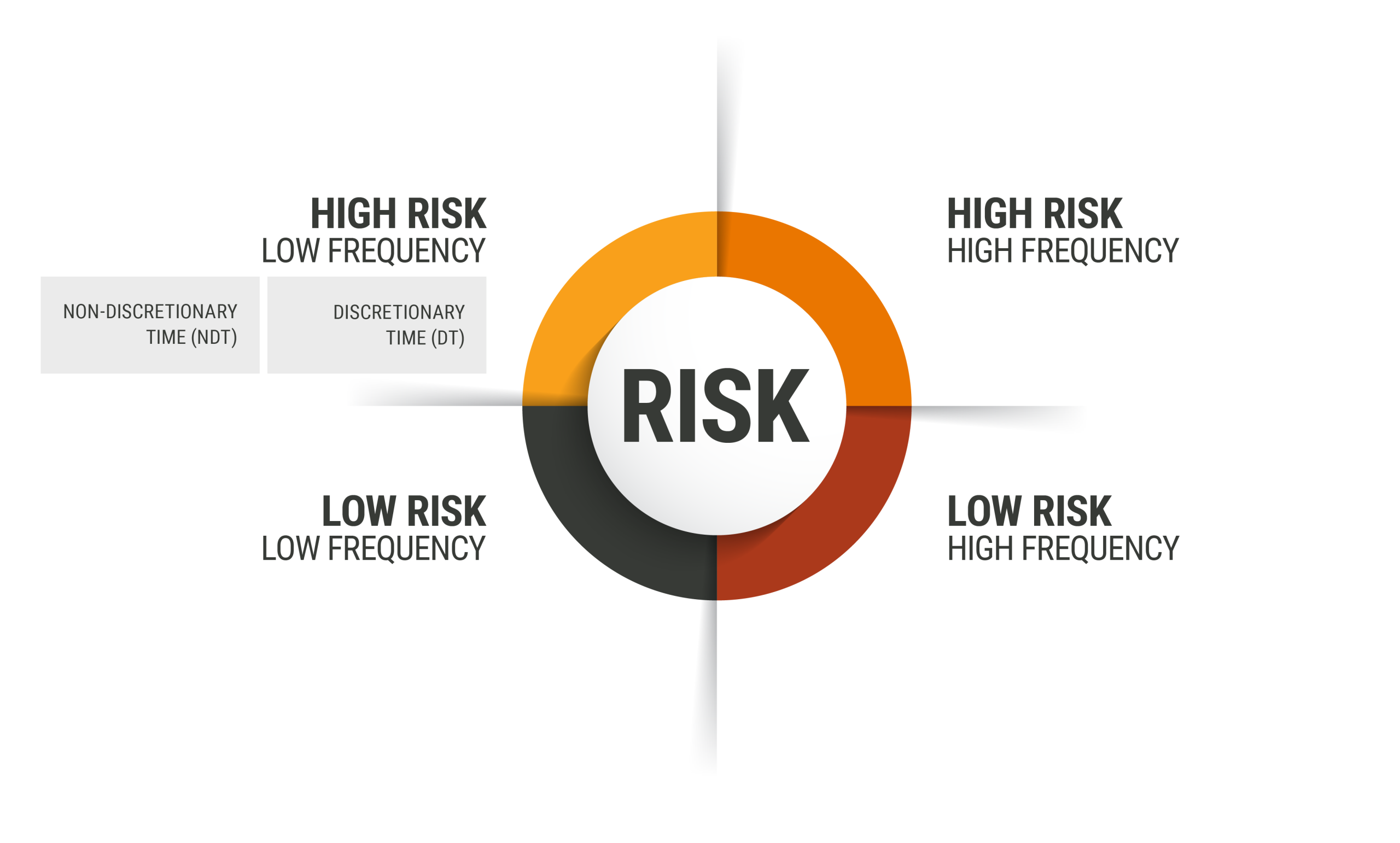Editor’s note: This article is part of a series. Click here for the previous article.
In our last visit I talked about the importance of RPM—recognition, prioritization and mobilization for the limited number of tasks in each job description that are overrepresented in causing public safety personnel problems. Again, I will make reference to the “risk/frequency” matrix:

When I first saw this graphic back in the last century (1975) this is exactly what it looked like. In 1980, as I was working on what I was going to do for the rest of my life, I divided the top left box into two areas to help you prioritize these high-risk/low-frequency events. Please note this modification the chart below (which has since been further updated by the excellent design team at Lexipol):

As you can clearly see, I divided the top left box into two parts, the discretionary time events (DT) and the non-discretionary time events (NDT). What do I mean by this distinction? Some things we do give us time to think, while some require instant action. The left portion of the top left box is of the greatest concern to me.
In every job description in your agency there are a very small number (certainly less than 15 and probably less than 10) kinds of events that fall into the NDT area. I have referred to these events over the years as the “core critical tasks”—very risky, done very rarely, with no time to think.
Included here are workplace violence incidents, chemical spills, shoot/don’t shoot, CPR, pursuits, earthquakes and other natural disasters, and similar events. These are the tasks that have higher priority in my way of thinking, as they have a higher probability of getting you in trouble. These are tasks that require regular and ongoing training.
Training prepares us for the mobilization component of RPM. It’s very important that every day is a training day and that at least part of your training is focused on the core critical tasks—tasks that fall into the left portion of the top left box on the risk matrix.
The good news: In an average career of 30 years, less than one shift is spent on this type of task. The bad news: In an average career of 30 years, less than one shift is spent on this type of task.
Because of the high level of risk involved in the tasks that fall into the left portion of the top left box, training on these tasks is essential. Your personnel need to be covering these tasks regularly to make sure they know what to do if they ever get involved in the HR/LF/NDT family of tasks.
If you are thinking ahead as you read this, you now know the genesis of the Daily Training Bulletins (DTBs) provided by Lexipol. Every day must be a training day! And training needs to include these core critical tasks.
For those of you who are not yet clients of Lexipol, here is how it works. When personnel log on to the department computer (or access the Lexipol app on their smartphone) during their shift, they can access a DTB. These brief training bulletins are designed to be read in less than two minutes and each is followed up with a test question. Please trust me, there are no “trick questions”—if you have read the training bulletin, the correct answer will jump off the page for you. Answer the question and then get on with the remainder of your shift responsibilities.
This is an essential component of the Lexipol Knowledge Management System (KMS) and it has multiple benefits, including verification of level of knowledge and providing a record should your training become a question in a later courtroom proceeding.
As Paul Harvey used to say in wrapping up his daily comments, “And now you know the rest of the story.” You, my friends, now know the story of core critical tasks and the importance of training on them.
In my next article I want to show you the value of constant, ongoing training. In every profession there are examples of tragedies averted because the involved employee took their training seriously. Until then, please work safely.
 TIMELY TAKEAWAY—Please do not think this training is limited to your job in public safety operations. This concept has a lot of applicability for your personal life. My guess is you have had discussions with your family regarding what to do in the event of a house fire or what to do if Grandpa or Grandma falls down the stairs. The same concept applies—every day must be a training day![strategem_author][vc_custom_heading text=”Today’s Tip: Gordon Graham shares his views
TIMELY TAKEAWAY—Please do not think this training is limited to your job in public safety operations. This concept has a lot of applicability for your personal life. My guess is you have had discussions with your family regarding what to do in the event of a house fire or what to do if Grandpa or Grandma falls down the stairs. The same concept applies—every day must be a training day![strategem_author][vc_custom_heading text=”Today’s Tip: Gordon Graham shares his views
and expertise on public safety issues” font_container=”tag:h2|font_size:36.73|text_align:center|color:%23ffffff” use_theme_fonts=”yes”]



